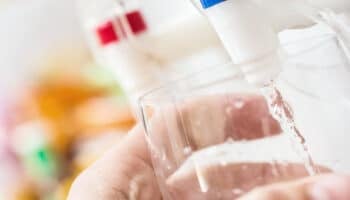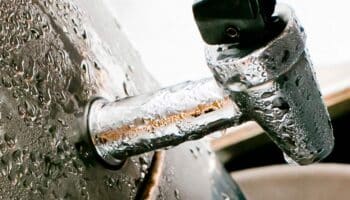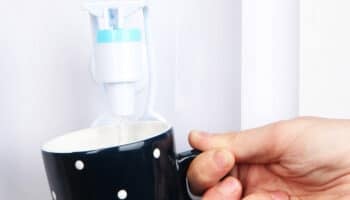Does your water cooler keep freezing up? You might want to check your jugs’ temperature.
Nothing can beat having a steady supply of water in either your home or office. Water coolers are so convenient that it’s unsurprising that they’ve become a necessity for our everyday lives.
Do you want a chilled jar of water for a refreshing release from a hot day? You got it! Are you just starting your morning, and need a nice, hot cup of coffee? No problem. There is virtually nothing these appliances cannot do when it comes to satisfying our hydration needs.
Now, before you start thinking that I’m trying to sell you a new model, I’ll come clean.
I want to help you.
If you’re here reading this, you do not need to buy a new water cooler. You already own one, and the water in it keeps freezing up.
What is going on?
There are several reasons why you might be in this unfortunate situation. From improper temperature adjustments to a faulty thermostat. The possibilities are nearly infinite. You need a clear idea of what to look out for in order to fix this problem quickly.
This is why I have prepared the list below, where you’ll find the most common causes of this occurrence and the easiest steps to resolve them.
Are you ready? Let’s get busy!
Fixing a Freezing Water Cooler
I sometimes find it funny how the most seemingly simple appliances can render us clueless when they fail. I bet you had never spared a single thought to how water coolers worked before you started having trouble with yours.
Most people make the grave mistake of opening their appliance immediately before previously considering all the external factors that could be at play.
I want to keep you from becoming a part of that group.
We will open your appliance eventually, but before we do that, let’s take a look at the most likely reasons why your water cooler keeps freezing up:
- Cold water jugs
- Improperly adjusted temperature
- Leaking Freon
- A broken compressor
- A faulty thermostat
#1 Cold Water Jugs
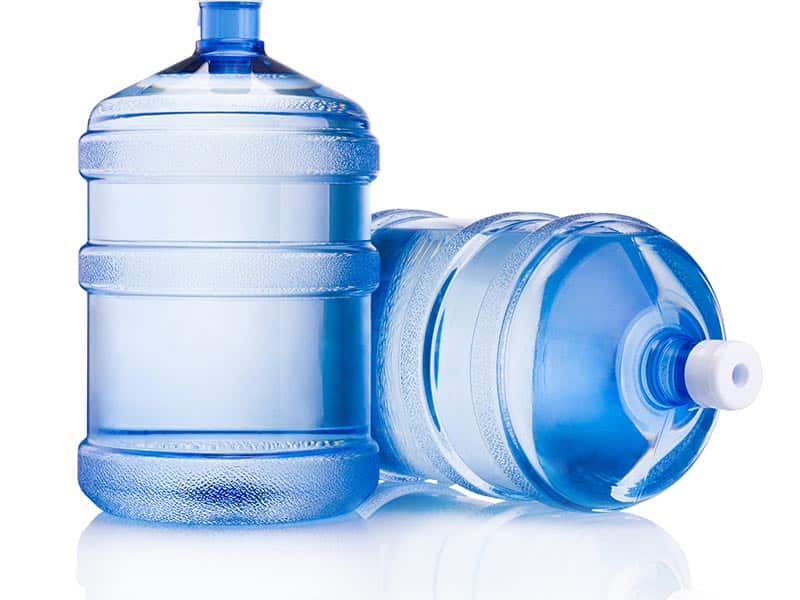
This may sound strange, but your manufacturer’s transportation conditions could be playing an important role in your frozen water problem.
Chilled water jugs will not create this problem on their own, but when coupled with other possible issues, such as an improperly adjusted temperature knob, or a leaky Freon gas tank, the chances of you experiencing this inconvenience, are much higher.
Your location and the weather conditions present when you’re reading this might make this situation more or less likely to happen.
Solution: Try to be a little more vigilant regarding your water jugs’ temperature before placing them in your water cooler. Leaving them to heat up a little and reach room temperature might reduce the chances of this happening in the future.
#2 Adjust the Temperature
I know what you’re probably thinking, “this is too obvious, and would never slip my mind”. While normally I’d agree with you, remember that it’s the most seemingly unimportant factor, that we tend to overlook more often.
If your water cooler keeps freezing up, and you’ve already ruled out the possibility of the water in the jug coming in too cold, there’s a very good chance that you need to slightly adjust the temperature knob in the back of the unit.
In theory, the temperature should have been set adequately by your manufacturer, but in case it wasn’t, setting it yourself is fairly simple. Here’s a video to show you the process.
Solution: In order to adjust the temperature of your water cooler, first you will have to carefully unplug it. Once you have done that, turn it around so that the back part of the appliance is exposed.
On most models, the temperature regulation knob should be located on the left side, not too far below where the jug meets the unit’s body. Turning it clockwise with a screwdriver will make the water colder while turning it counterclockwise will heat up the tank.
In your case, you want to turn this knob counterclockwise to thaw out the reservoir.
#3 Leaking Freon
In case you’ve owned water coolers before, or read the user manual right after you bought your unit, there’s a very good chance that you already know what the Freon gas inside it is used for.
If so, please skip down to the solution. Otherwise, please read on.
It could be said that Freon gas is the lifeblood of your appliance. Without it, your water cooler would not be able to provide you with cold water, and you’d be forever stuck with room-temperature beverages.
I won’t bore you with the technical details, but in a nutshell, this gas cools down the water entering your reservoir and keeps it cold, so that, when you press down on the spigot lever, you get a refreshing, chilled cup of it.
This gas is very useful and offers a wide variety of solutions to both water coolers and other low-temperature-reliant appliances. That being said, Freon tanks can occasionally leak, and cause a lot of problems.
If your water cooler keeps freezing up, chances are that the water in its reservoir is being exposed to excessive amounts of Freon, causing it to cool down too much.
Solution: Check your Freon gas for leaks. To do this, you will need the help of a professional.
Can you try, and fix it yourself? Not really, and there are two very good reasons for that.
Number one, accessing the tank can be a little challenging for people who are not familiar with water coolers and their internal components, and number two, Freon gas is a controlled substance that is potentially harmful when in direct contact with human skin.
Not to mention that the tanks are highly pressurized, so there is always the risk of explosion.
Please, even if you somehow manage to access your Freon gas tank, do not try to fix it yourself. Leave that to certified professionals.
#4 A Broken Compressor
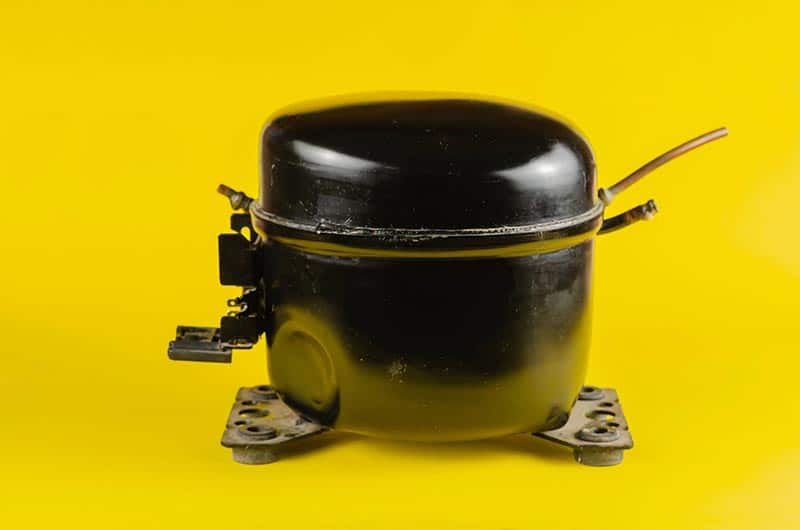
Assuming that none of the solutions above have worked out for you, let’s look at the possibility of a broken compressor.
While from the outside, water coolers might seem like they only rely on gravity, this is not the case.
In reality, your unit also needs a compressor to circulate water throughout it. If your model has both a hot and cold water spigot, this part is also responsible for passing the liquid through the heating element before pouring it into your cup.
Being such an important component, it should come as no surprise that when it fails, a lot of problems could arise, and frozen water is one of them.
I’ll explain why.
A faulty compressor becomes incapable of transporting water throughout your machine effectively. This results in the liquid being exposed for too long to the Freon gas.
A clear indicator of this problem would be regular temperatures in the reservoir, and chilled, or icy cups of water coming out from the spigot.
Solution: To fix this, you will have to go in. Please follow these steps:
- Carefully unplug your appliance, and let it cool down
- Remove the water jug, and undo the screws at the top of the unit’s body (this might vary from model to model)
- Remove the outer plastic/metal casing to expose the appliance’s guts
- Identify your compressor, and test it for continuity with a multimeter, if you have one
Remember, null readings (0) on your meter mean that the part needs replacing. You can easily buy a new compressor from your nearest hardware store, or directly from your manufacturer.
This repair can be a little tricky, so I would strongly advise calling a technician to take care of it for you.
#5 Your Thermostat Is Faulty
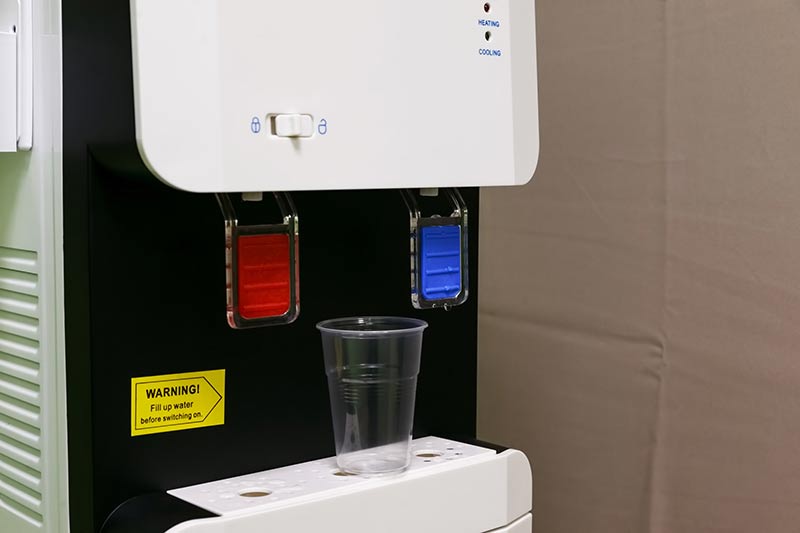
Lastly, let’s take a look at your thermostat.
As you know, this little part is responsible for measuring and regulating your appliance’s internal temperature.
When it’s functional, adjusting the knob at the back should do the trick, but when it fails, it could read your water cooler’s temperature incorrectly, and cause the water to freeze.
For example. Let’s say that your water temperature is 41 °F (5 °C). This is enough to be refreshing, but it’s still above water’s freezing point, right? A faulty thermostat could think the water is warmer, and try to cool it down further.
If nothing else has worked, and your water cooler is still freezing up, this could be the reason why.
Solution: Please follow the steps from the previous point to expose your thermostat, test it with a multimeter for viability, and replace it if necessary.
When Should You Call a Pro?
The answer to this question will depend on two things:
1. Your warranty
2. The state of your Freon gas tank
If you’re still under coverage, and your refrigerant tank is fine, do not hesitate to call your manufacturer. Unless otherwise specified, they should send a technician to do the repairs for free.
Provided that your warranty has expired, you can try doing the repairs yourself, that is unless the Freon gas tank is to blame. Again, if this is the case, please leave the job to someone who’s certified to do it.
Conclusion
Having your water cooler keep freezing up is a nightmare. Not only are you stuck without a steady supply of water, but also in the uncomfortable position of having to find a way to fix it.
Luckily, as you’ve hopefully learned from this piece, addressing most of the causes behind this occurrence is fairly simple, and quick. As long as the water cooler problem is not a leaky Freon gas tank, small actions like checking your jugs’ temperature or adjusting the regulator, should get your appliance back to normal in the blink of an eye.
Trust in yourself, and in your DIY skills, but most importantly, enjoy the freshwater supply!





